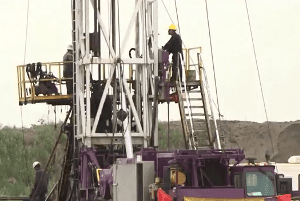
Fracking Moratorium Obstacles In The Assembly. Will Hydraulic Fracturing Not Pollute Water Supply. The Governor of New York recently announced hydraulic fracturing—known as fracking—will not occur in the state’s Marcellus shale region unless it can be proven that the procedure will not pollute water supplies. As we’ve previously written, fracking permits in the state have […]

Fracking Moratorium Obstacles In The Assembly. Will Hydraulic Fracturing Not Pollute Water Supply. The Governor of New York recently announced hydraulic fracturing—known as fracking—will not occur in the state’s Marcellus shale region unless it can be proven that the procedure will not pollute water supplies. As we’ve previously written, fracking permits in the state have been on hold for two years as regulators complete an environmental review expected this year. PressConnects.com reports that a bill pending approval in the Assembly could be delayed until mid-May 2011.
In New York, fracking has been particularly controversial. The state’s Marcellus shale region encompasses the entire Catskills watershed that provides New York City with all of its drinking water. People there are worried that drilling could pollute the watershed.
The bill will likely have the needed votes to pass the House; however, most—five of six—local assembly members promised to vote against the measure, thus banning fracking until May 15, 2011, said PressConnects.com. Meanwhile, until the state Department of Environmental Conservation completes its review of its Supplemental General Environmental Impact Statement, the horizontal drilling in the Marcellus region will remain pending, said PressConnects.com. The Impact Statement is meant to put rules in place for high-volume fracking, noted PressConnects.com.
Gas drilling via fracking has been the subject of controversy nationwide. Critics claim chemicals used in the process, coupled with a lack of regulation, are endangering the environment and the health of people who live near such drilling operations. Indeed, water contamination, air quality problems, and an increase in health ailments have been reported in several communities where fracking operations are prevalent.
Fracking is now used in about 90 percent of US gas and oil wells and involves injecting water, sand, and a cocktail of chemicals at high pressure into rock formations thousands of feet below the surface. Because the federal Energy Policy Act of 2005 exempted fracking from regulation under the Safe Drinking Water Act, shale gas drillers don’t have to disclose what chemicals they use. According to a report issued by the Environmental Working Group, fracking has been linked to drinking water contamination and property damage in Colorado, Ohio, Pennsylvania, and Wyoming.
“It appears now that (the DEC’s) review will continue into 2011, and we have no indication that it will wrap up anytime soon,” said Assemblywoman Donna A. Lupardo, Democrat-Endwell, quoted PressConnects.com. “I anticipate they will go well into 2011, so a May 15 moratorium deadline in light of the progress DEC is making seems arbitrary,” added Lupardo.
After much debate between advocates on both sides—environmental and the gas industry—the state Senate passed the bill just prior to the end of the legislative session, said PressConnect.com. Discussions are expected to continue in September. Those voting against the bill are urging to allow the DEC to finish its review versus temporarily banning fracking, said PressConnects.com.
Others disagree, seeking a moratorium until the EPA files its report in 2012. “Looking around the county …we know there are a lot of risks here. There are a lot of problems with water and people’s health. They’re serious problems, they’re real problems, they’re longstanding problems, and I don’t think we know nearly enough about this process,” said Ithaca Assemblywoman Barbara Lifton, a Democrat, quoted PressConnects.com. Some 14,000 NY State wells use fracking.
In a recent interview with Syracuse radio station WSYR Governor David Paterson said the drilling controversy was a “clash between a very lucrative profit-making opportunity and a very serious public safety hazard,” promising that no new drilling permits would be granted until there is “overwhelming evidence that nothing will happen” to water supplies.
The personal injury attorneys at Parker Waichman LLP offer free, no-obligation case evaluations. For more information, fill out our online contact form or call 1-800-YOURLAWYER (1-800-968-7529).


